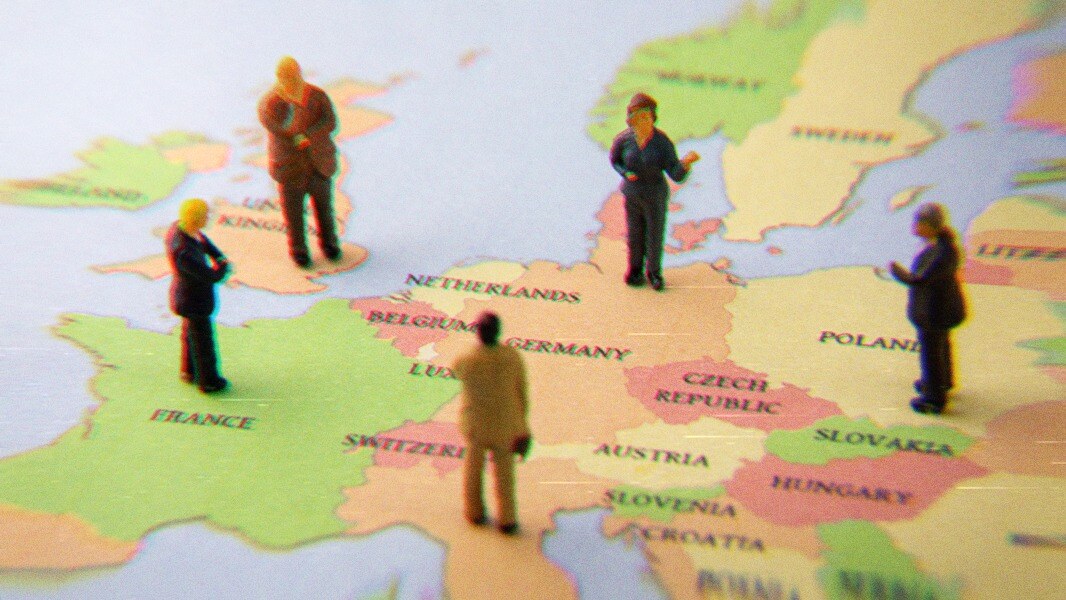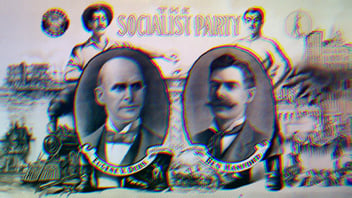Europe Slides to the Right.
Unpacking the EU Parliamentary elections.
 Image Description: Figurines of people standing on a partial map of Europe.
Image Description: Figurines of people standing on a partial map of Europe.
Warning. If you’re European, please look away from this essay. The level of ignorance on display regarding European politics and elections may induce severe and uncontrollable rage.
Chapter One: Alphabet Soup
Parliamentary elections were held in the European Union last week.
It did not go well. Check that. It went very well for the right-wing movement in Europe.
Most Americans caught wind of some kind of election in the European Union (EU) but it’s fair to say that few really understand what it was all about. And with good reason. This shit is really confusing. Scores of parties under the umbrella of seven coalition parties, 720 members representing 27 nations, two councils, one commission, a bank and court. No one is in charge and everyone is in charge.
So before we dig in, what questions can I answer for you?
Who was elected? What were they running for?
The elections were for the Members of the European Parliament (MEP), which is kind of like the House of Representatives of the EU.
Is there a Senate?
Kind of. They have the Council of the EU. Which is, of course, different from the European Council.
The EC?
Yes, but not the same EC as the European Commission.
So there are two ECs?
Yup. See if you can follow along...
The EU is made up of the European Council (EC) and the European Commission, the other EC. The Parliament is made up of 720 MEPs that are elected as members of individual parties from member states or coalition parties that are also on the ballot in those nations. Then, ministers from each state are chosen to be on the Council of the EU, while commissioners from each of the 27 member states are appointed to the European Commission, which is kind of like the executive branch of the EU. The judicial branch is represented by the EU Court of Justice and there’s a central bank overseeing each member nation’s central bank called the European Central Bank (ECB).
The Parliament is made up of MEPs representing several parties. Most are a coalition of scores of national parties from each member state and then there’s one central party called the European People’s Party (EPP), that citizens of member countries can also vote for. Sometimes the individual parties fall out of favor with the umbrella party, which happened in this election when the far right German Party, the AfD, was kicked out of the Identity and Democracy Party (ID) because it was seen as too extreme. And there are individual candidates that can also run unaffiliated and throw their support wherever they choose when parliament is formed.
Still confused? Me too. See translation below
Chapter Two: Translating the EU to American
Let’s zoom out and put the EU in context. The EU formed in 1957 with six founding members: Belgium, France, Germany, Italy, Luxembourg and the Netherlands. Over time it added members to where it stands today at 27.
Not to make this all about us, but the EU is basically the European Continent’s answer to the United States. Being a member state means you agree to certain economic, agricultural, immigration and environmental laws and policies. Most, but not all of these countries also use or at least accept the Euro as their currency. While not a military alliance or single body like the United States, the idea was to establish a broader, quasi-federal economic and legal framework so Europe could compete with larger economies like China and the U.S. and trade on a more equal footing.
It’s a complex yet, in some ways, fragile alliance that not everyone in Europe loves, as evidenced by the Brexit vote a few years back. Overall though, Europeans are largely in favor of being part of the EU. That said, the minority factions that are vehemently opposed to it are loud and getting louder. And that’s what this election somewhat demonstrated.
Every five years citizens of the member nations in Europe head to the polls to elect the MEPs, with more than 400 million Europeans eligible to participate. As we said up top, the Parliament is like the House of Representatives in that there are a bunch of open seats—720 to be exact—representing an array of political parties from all over Europe.
Broadly, the major parties in the European Parliament—from left to right—are as follows:
- You’ve got The Left Party, which is obviously on the left
- The Green European Free Alliance, resident environmentalists of the EU
- The Socialists and Democrats, which are actually considered center left
- Renew Europe, a centrist party most associated with Emmanuel Macron
- The center right European People’s Party (EPP) where the current leader Ursula von der Leyen hails from
- The European Conservatives and Reformists (ECR) most closely affiliated with right-wing Giorgia Meloni of Italy
- And the far right Identity and Democracy Party (ID) tied to the villainous Marine Le Pen, Macron’s nemesis in France
Here’s the first wrinkle that makes it a bit different. You can have a left wing party in France and one in Germany that appear similar when you line them up head-to-head but they can fall under different umbrella parties. So the first step is to affiliate national parties with the umbrella party that most closely resembles the desires and interests of each nation. Liberalism and conservatism might have very different meanings in France and Hungary. That’s how we get seven major parties, but the individual parties can be severed from the umbrella. That’s what happened with the far right party in Germany, for example. It’s one of the quirks that makes it difficult to tally the final vote until the dust settles completely.
Anyway, the MEPs that are eventually seated wind up in the parliament, which creates legislation that is passed to the Council of the EU. This is the body that acts more like the Senate, if we need to draw a comparison. This council is comprised of ministers from each member state. Now, in Parliament the leader is typically drawn from the party that has the biggest majority. In this case it’s the EPP, which is a centrist party that is leaning increasingly towards the right. And we’ll talk about the differences among and between these right wing factions because that’s an important piece of the puzzle. But let’s continue breaking down the structure before we get there.
Each of these bodies has a leader. There’s someone in charge of the European Council, the European Commission, the council of the EU, Court of Justice, Central Bank and Parliament. It’s why we don’t really think of a central figure like a president or prime minister when it comes to Europe. But of all these organizational heads, it’s the head of Parliament that is most often recognized as the top of the hierarchy. This figure is responsible for the politics of the EU. Setting the agenda, building coalitions, establishing legislative priorities and coordinating with other heads of state. Currently that person is Ursula von der Leyen, a center right politician from Germany. And as head of the EPP, the largest representative bloc in Parliament, von der Leyen is the odds on favorite to continue in the role but that’s where our story gets interesting.
We can talk about the importance of these elections in two ways: Perception and reality. Most people on the left right now are freaking out more about the perceptual aspect. Think of these parliamentary elections as you might the U.S. midterm elections. Sure, there can be a shift in the balance of power, but it’s mostly seen as the electorate sending a message to the executive branch. In this sense, this election was a fairly bold rebuke of liberal and leftist policies across the board. From the far left to the center, it was a bloodbath.
Again, these aren’t final numbers but as of this writing the Left Party lost two seats and had the smallest to begin with. The Socialist and Democrats Party lost four seats; the Green European Free Alliance lost 18; and the Macron-led center party, Renew Europe, lost 19, the biggest absolute loss of the election.
The big winners were the far right ID Party associated with Le Pen with a nine seat pickup, the Meloni-led ECR with three additional seats and von der Leyen’s EPP was the big winner with 13. Heading into the election there was a sense that the right had the hot hand and this is where the jockeying and posturing went into high gear. So let’s talk about the right-wing in Europe and name names.
In the Netherlands, far right party leader and rampant Islamophobe Geert Wilders didn’t have as strong a showing as he had hoped, but he has still moved from the fringes and onto the main stage in Europe. He shares this stage with figures like AfD co-chair Alice Weidel in Germany, Marine Le Pen in France, Viktor Orbán in Hungary and Giorgia Meloni in Italy. Save for Orbán, these political figures were outliers and troublemakers for the most part until recently. Now they’ve become important power brokers in von der Leyen’s bid to hold onto the top spot. With far right and conservative parties picking up so many votes in this election, the EPP may have no other choice but to form alliances to its right to hold onto power.
But not everything is hunky dory on the right. There are serious differences between the parties that prevent them from forming a more durable alliance. Perhaps the biggest chasm of all is the war in Ukraine. The far right in Europe is very much aligned with Vladimir Putin and vehemently opposes supporting Ukraine. The conservatives are more supportive of Ukraine but are calling for a diplomatic end to the conflict, with the EU playing a major role in negotiations. And the center right has been firmly aligned with Ukraine, which is the biggest stumbling block the EPP has at the moment in wooing more support from the far right.
So in terms of perception, the right wing parties of Europe are gaining legitimacy in a way they haven’t experienced in several decades. Of course, when it comes to the European continent, hard right turns have a history of working out very poorly.
I suppose it’s a fair point to suggest that electoral rebukes of liberal policies are hardly indicative of a slide into fascism. But then again, Victor Orbán is one of the longest tenured leaders in Europe and parties like the AfD in Germany, and Le Pen’s Rassemblement National (National Rally) have some pretty fascistic ideas. And that’s where this moves from perception to reality.
So, let’s talk about sugar beets.
Yes, sugar beets. It’s one of the most prominent crops in France and super important to the global supply of sugar. One of the reasons sugar prices have been so high is because of environmental regulations on the use of certain pesticides that prevent insects from destroying sugar beet crops. These regulations, intended to preserve honey bees, caused French farmers to turn away from producing sugar beets even though prices are going through the roof.
Scenes like this are playing out all across Europe because one of the areas the rubber meets the road in the EU is environmental standards and regulations. And Big Ag in Europe is fed up. Agriculture remains vital to the identities and economies of several European nations and the increasing oversight from the big brother EU Parliament is wearing thin.
Anti-immigration sentiment has also increased dramatically over the last decade or so, which was one of the primary drivers of Brexit and a flash point in the Netherlands and France among other countries. Mixing this sentiment together with high borrowing costs combined with sustained austerity measures from central economic authorities continues to aggravate several national leaders and the combined inflation and interest rate pressures have filtered down to the household level as well.
This all sounds vaguely familiar.
Populations that feel economically squeezed while their bourgeois liberal governments do little to halt rising inequality blaming elites and globalists for financial insecurity while immigrants fleeing political and climate crises stream across borders?
Yup, that’s the part.
So the reality of the parliamentary elections might be much more than people sending a proxy message to their individual leaders. There will likely be real change in European policies toward economic measures, environmental standards and immigration laws. And if we play that out a step further, one can easily see how this accelerates each one of these factors in a negative way. Loosening environmental standards will slow the progress made in the EU toward hitting its IPCC targets. This, in turn, will hasten the degradation of the climate, which will spur more climate refugees. The loss of productive agricultural land to the ravages of climate change will contribute to food shortages, which will have an inflationary impact on food prices.
And the cycle of madness continues.
Chapter Three: As Goes Europe, So Goes the World
Perhaps the biggest reaction to the right turn in Europe was in France. According to The New York Times:
“In France, the voting ushered in a political earthquake. Soon after the results were announced, President Emmanuel Macron announced on national television that he would dissolve the country’s National Assembly and call for new legislative elections.”
Snap elections like these can be unsettling but they happen more often in parliamentary democracies than you might imagine. Some think Macron is playing with fire and that he overreacted. Supporters are more optimistic, believing that Macron’s centrist party will remain in favor thereby quelling the momentum of Le Pen’s perceived surge and taking the wind out of the sails of the National Rally. Essentially, the idea is that he’s trying to prove the EU elections are just warning shots that don’t reflect the true will of the people.
Then there are those who see this as an incredibly cynical play to say, ‘go ahead, you run the country.’ For now, Macron is actually protected in his role as president. It’s the French national assembly members that have to fight for their political lives. If he loses and the country grinds to a legislative halt, it would further frustrate the masses and demonstrate the right’s inability to lead. In theory, Macron wins either way: Either he’s vindicated by the electorate or vindicated by the right’s ineptitude.
If anyone embodies everything wrong with the liberal establishment in Europe and around the globe, it’s Macron.
The French leader has found himself increasingly isolated from both the left and the right. Marine Le Pen, while falling short of gaining enough power to topple Macron, has proven to be a stubborn opponent; moreover, she has succeeded not only in uniting the right in France but increasing her visibility on the European stage.
The left in France was finally able to coalesce around Macron’s anti-labor policies in the last elections, but that alliance appears to be waning. As the Jacobin writes:
“The alliance of all left-wing formations from the Parti Socialiste via the Communists, the Greens, and France Insoumise [en-soo-meez]— seems to be disappearing. These parties are all running separate lists for the EU elections. Worse, this division is taking place at a time when in France, as around Europe, we are seeing rampant inflation, growing social grievances, and — above all — a massive far-right breakthrough. The question of how to form a common front faced with these pressing demands is thus a recurrent concern on the French left.”
Macron has managed to piss off almost everyone in an attempt to straddle the middle and assert himself as the ultimate statesman; the one man able to meet the moment on a continent in turmoil. He’s become increasingly militaristic and anti-working class in an attempt to pass himself off as strong and in charge. This is, as usual, such a classic blunder on the part of the liberal bourgeoisie, always desperate to maintain power by projecting strength. Again, The Times:
“Right-wing parties now govern alone or as part of coalitions in seven of the European Union’s 27 countries. They have gained across the continent as voters have grown more concentrated on nationalism and identity, often tied to migration and some of the same culture-war politics pertaining to gender and L.G.B.T.Q. issues that have gained traction in the United States.”
The World Socialist Web Site nails it when it comes to figures like Macron or von der Leyen:
“The rise of the far right is the product…of the systematic disenfranchisement of the workers by nationalist, bureaucratic organizations that the media and the ruling class promote as the ‘left.’ Unlike the far right—which tries to exploit mass discontent with the existing political system…these parties of the affluent middle class exude complacency and self-satisfaction.
“Even in the face of war between nuclear-armed powers, genocide and the surge of police state and fascistic forms of rule, these organizations insist that popular opposition must be tied to debilitating alliances with parties of capitalist government and allied union bureaucracies. Whatever criticisms they make of the far right, they are far more hostile to Trotskyism and to building a revolutionary movement in the European working class for socialism.”
I think we can all agree that a far right nationalist surge in Europe has a pretty terrible track record.
This moment is reminiscent of another time the European nations were tested by a war on the continent that drove nationalist tendencies. After the shock of the Russian Revolution, there was a sense that Germany might be next in line for a socialist movement to take root. Instead, the German SPD leaned into bourgeois nationalism and turned its back on populist worker movements by issuing war credits. Left movements were brutally put down leading to the executions of key figures like Rosa Luxemburg and Karl Liebknecht, effectively neutralizing the left-wing in Germany and paving the way for Anton Drexler’s German Workers’ Party, which eventually morphed into the German Nazi Party. And it all happened within a few short years.
So when conservative blowhards like Douglas Murray assume patronizing postures and dismiss the correlation between far-right rhetoric and fascistic tendencies, they’re either historically illiterate or deliberately obfuscating. Snuffing out left-wing movements and promoting half measures that ignore the authentic expressions of disenfranchised workers is a dangerous game.
We’re seeing it in the United States. Just take Biden’s border policy. His half-hearted “root cause” strategy in Latin America ignored the larger context of economic and physical insecurity that looms over many of the originating migrant nations. It was wholly insufficient to bring about real change and failed to halt the flow of asylum seekers at the border. And so he moved right in an effort to steal Trump’s thunder on the border ahead of the election.
At the very moment the United States needs a coordinated left-wing movement to address the concerns of the working class, the so-called left is in shambles. Cornel West and Jill Stein are rounding errors in the grand scheme of things and even they’re at odds. The Bernie wing has splintered over the massacre in Gaza and failure to mount a united progressive front to pull the Democratic Party to the left as well. The only three candidates in contention for the presidency are center right, far right and who the fuck knows. Same holds true in Europe where the far-left finds itself in utter disarray and on the outside looking in as the EPP coordinates with the likes of Meloni and Le Pen to retain power.
Capitalism will always produce half-measures that betray the working class and build wealth and power among elites. It will always protect those in power and pit the bureaucrats against those they’re hired to serve. We know from our progressive meditation essay that we lost the 2024 election a long time ago, and now Europe is heading in the same direction. Left-wing victories in Latin America are the outliers in the world today but they provide at least a glimmer of hope that leftist values can take hold. The only question is whether these lights will burn bright enough to guide progressives before capitalism’s final act brings about the next Great War, and we descend further into the climate abyss.
Here endeth the lesson.
Max is a basic, middle-aged white guy who developed his cultural tastes in the 80s (Miami Vice, NY Mets), became politically aware in the 90s (as a Republican), started actually thinking and writing in the 2000s (shifting left), became completely jaded in the 2010s (moving further left) and eventually decided to launch UNFTR in the 2020s (completely left).


